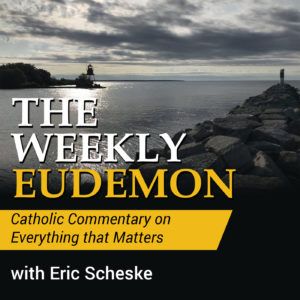Episode 75

New Episode Released
Episode 75: Charles MacKay, Popular Delusions, Radical Spiritualists
Some Protestant sects were freakish, whether the Anabaptists in Munster or those iconoclastic peasants who took craps in holy water fonts, the Reformation brought more freaks to the open than a hurricane brings starfish to the beach.
As a preliminary matter, let's take a general look at the various sects, freakish and non-freakish.
First, you can argue that all Protestant denominations besides the Adventists and Pentecostals (it has always cracked me up that the Pentecostals started in LA in the early 1900s, but man, talk about explosive growth) can be traced to the four early branches of the Reformation: Lutheran, Reformed/Calvinist, Baptist/Anabaptist/Radical, or Anglican.
Lutheranism obviously started with Martin Luther. Although we commonly refer to 1517 as the year the Reformation started, you can't say there was a separate Lutheran church until 1519, possibly 1520. At that point, Luther was excommunicated and people were still following him and going to his church services.
The Reformed branch of Protestantism started in Zurich, Switzerland, by Huldrych Zwingli at about the same time. By 1522, the priest Zwingli was in open revolt against the Catholic Church and banging a wife (a common theme among reformers . . . “It's all about doctrine and the Bible and, uh, and . . . Damn, she's hot”). Zwingli, it must be noted, came to his doctrines quite apart from Luther. It was never like he was a follower of Luther and then branched off. They started separately. John Calvin would later pick up the Reformed banner in the 1530s. From this school comes today's Dutch Reformed, Presbyterians, Congregationalists, Church of Christ. You can even pin the insufferable Puritans on the Reformed/Calvinist branch.
Years later, the English Reformation started with Henry VIII when he saw Anne Boleyn and said, “Damn, she's hot, maybe as hot as her sister Mary who I've been banging for years.” He asked the Pope for an annulment of his marriage from Catherine of Aragon, was denied, and decided to establish his own church, with its own Pope/leader in the form of the Bishop of Canterbury, who annulled his marriage to Catherine, paving the way for legalized banging of Anne Boleyn. From this you have today's Anglicans and Episcopalians. The Methodists and Wesleyans are offshoots, but so different, you can't even call them part of the Anglican tradition.
And then you had the Radical Reformation. The Anabaptists. They were among the earliest and most enthusiastic reformers, eagerly listening to Luther and plowing forward. Depending who you ask, they actually pre-date Zwingli and the Reform branch of Protestantism. From this branch, you have today's Mennonites and Amish.
Included within the Radical Reformation “label” are the Radical Spiritualists and the Evangelical Rationalists. These are the proto-modern-day liberals: socio-economically higher class, often well-educated.
The Evangelical Rationalists were basically proto-Enlightenment thinkers, in the vein of Voltaire and other rationalist snobs. Their big things were denial of the Trinity, Bible only, and use of human reason. I'm not even sure it's properly called a religious movement and I'm not going to discuss it here.
The Radical Spiritualists, on the other hand, were definitely religious. It's odd that the Radical Spiritualists, and even the Anabaptists, were often excluded from discussions about the Reformation up until the 1960s, when historians started to appreciate their importance.
Extremely radical. They reject almost every aspect of religion that might be external: that is, anything that is not part of the individual soul. All religious institutions . . . every church . . . Catholic, Lutheran, whatever. All ceremony and ritual. All clergy. No authority figures. No sacraments, rejecting even the Reformed position that sacraments are useful symbols; they deemed the sacraments as distractions. They even reject the Bible. They only believe in “the inner light.” Or the “inner spirit.” The direct revelation of God to the individual soul. Direct divine revelation.
The earliest examples of this are the Prophets of Zwickau, who taught this about themselves in 1522. The Radical Spiritualists said many believers, not just the Zwickau prophets or other handful of selects, have this “direct indwelling of the spirit,” basically, that God lives in the soul, making each person divine. If you have the inner spirit, you're saved. If you don't, you aren't saved. How do you get it? Historians aren't sure what the Radical Spiritualists taught. I guess it would make sense. Any sort of articulation of this would be external to the soul, so they didn't bother to develop doctrine or theology. The Radical Spiritualists basically said the inner light is like rhythm. You either got it or you don't, and if you got it, you know it. It was very cocky.
Caspar Schwenckfeld. Catholic. Followed Luther until 1525, then he broke. Rejected baptism, all formal church structures. Wandered throughout Germany, preaching, leaving behind followers. Sebastian Franck: Catholic priest, humanist, Lutheran, religion of the inner spirit: 1528. Wandering preacher. Thomas Munster: Catholic priest, Lutheran, broke in 1521 to become an adherent of the religion of the inner light. Big political activist. Organized the pheasant revolt in 1525 and was killed.
What we're seeing is the Reformation was immediately getting more and more subjective. Catholic: The Bible, the Pope, theologians, councils, etc. And then Luther and Zwingli: Bible only, as interpreted by each individual. And now the inner light is the sole standard of religious authority. The trend would continue into the modern era in the fiercely subjectivist philosophy from Descartes and into post-modernism with Derrida's deconstructionism (words have no truth in them and, because we communicate by words, we can't communicate truth, and therefore, anything anyone knows strictly wells up in himself . . . A material version of the “inner spirit” I suppose) and Foucault's radical cultural histories (every culture's “truths” are mere societal constructs).
